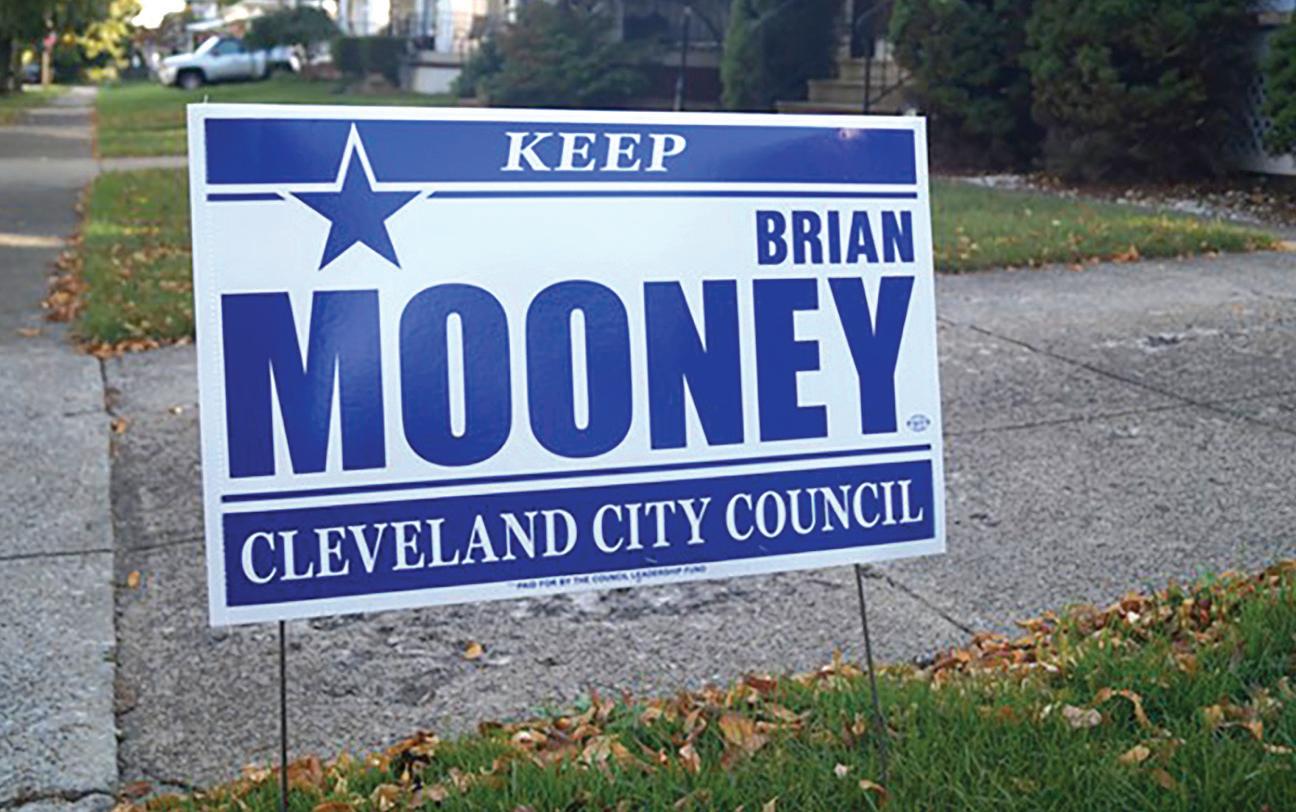
14 minute read
Upfront
UPFRONT UPFRONT

Advertisement


A NATIONAL BLACK ORG FUNNELED DAN GILBERT DOLLARS TO ANTI-KUCINICH PAC. THEN THE PAC WENT AFTER BIBB.

A WASHINGTON D.C.-BASED
organization devoted to building Black political power served as an intermediary for nearly $50,000 controlled by Cleveland Cavaliers owner Dan Gilbert during the 2021 mayoral primary, Scene has learned, and funneled it to Citizens for Change, the super PAC aligned with former city council president and mayoral candidate Kevin Kelley.
This financial arrangement was disguised by a campaign finance framework that delays donor identification in some cases and permits anonymity in others. And though it remained unpublicized, the arrangement inflected the response of the organization’s founder, Quentin James, who felt duped—and, others have suggested, culpable— when Citizens for Change pivoted from bashing Dennis Kucinich to bashing Justin Bibb, and doing so with racist tropes.
The D.C.-based organization is the Collective PAC. In August, it publicly endorsed Bibb, who went on to defeat Kelley in the November general election. A Super PAC affiliated with it is called “The Southern Strategy PAC.” Multiple sources with knowledge of the interaction said that this PAC was made available to accept Gilbert’s money and that it then donated his funds to Citizens for Change after assurances that they would be used only to target Dennis Kucinich.
Why Gilbert preferred to cloak his involvement in the primary is a mystery, especially because he went on to donate $50,000, via his company Rocket Holdings, to another PAC, Citizens for Cleveland’s Future, that was formed to back Kelley in the general. The media relations team at Gilbert’s Rocket family of companies has not yet responded to Scene’s inquiries.
Update: Rock Holdings, as it turns out, did not openly donate to Citizens for Cleveland’s Future. Ideastream reporter Nick Castele has confirmed that the $50,000 donation which was originally attributed to Rock Holdings was attributed to the Construction Employers Association in an amended FEC filing.
But regardless of his motives, The Southern Strategy PAC suited Gilbert’s needs. Among other things, its website is a veritable black box. It has no listed staff. Its address is a P.O. Box in Washington, D.C. Its only social media presence is a dormant Facebook page, the entire activity on which transpired over one 24-hour period in August, 2020. The email address linked from its “Contact” button is inoperable. All messages are returned to sender.
Its mission, outlined on the website, is the engagement of “new and unlikely” voters, including Black people and suburban women “at the heart of the emerging Democratic coalition across the South and in states and districts where the greatest barrier to electoral success is sufficient and sustained financial investment.” Beyond a $25,000 transfer to a related committee, The Southern Strategy PAC’s only contribution in 2021 was to Citizens for Change.
Scene managed to connect the dots only after after reviewing The Southern Strategy PAC’s incorporating documents, which list a woman named Jennifer May as treasurer. May is the founder of a D.C. consultancy called Next Level Partners, which provides, among other things, compliance and accounting services for Super PACs. According to the Federal Election Commission, Jennifer May is also the Treasurer for the Collective PAC. Both PACs also share a P.O. Box.
To some in the Bibb camp, The Southern Strategy’s activities smelled a lot like money laundering.
“Gilbert and Rock Holdings washed their money through [The Southern Strategy PAC],” one source with ties to the Bibb campaign told Scene.
But others said that, unfortunately, this was simply the nature of the United States’ campaign finance laws.
“It’s not [laundering],” said a source who spoke on condition of
UPFRONT
anonymity for legal reasons. “It’s just the system. There are donors who are allowed to play in politics anonymously. The borderline illegal thing was Citizens for Change going to donors and saying we’re going to do one thing, but then, by the way, we’re actually doing another thing. Every donor could technically ask for their money back.”
According to recent disclosures published by the FEC, there were only 12 donors that backed Citizens for Change. These donors contributed more than $250,000 in a flood of big-ticket donations in August and September. The Southern Strategy PAC was among them.
Some of Cleveland’s best-known oligarchs supported the effort: Browns owners James and Dee Haslam, ($44,000), who happen to be orchestrating a massive lakefront development plan to further enhance the value of their pro sports franchise; Greatest Generation tycoon Albert Ratner, ($42,500); Dick Pogue himself, (a paltry $2,500); Minute Men Staffing baron Jason Lucarelli, ($25,000); developer Wesley Finch, ($10,000); David Heller, President and CEO of the real estate development firm NRP Group, ($10,000); Randy Myerhoff, ($10,000), CEO of accounting firm Cohen and Co.; Miami’s own Sheldon Guren, ($5,000); and technologisttitan Dan T. Moore, ($2,500), longtime Metroparks Commissioner and big-game hunter.
Despite the towering wealth of these regional personages, it was the Cleveland Building and Construction Trades Council, presided over by the brash Dave Wondolowski of Broadview Heights, that donated the most total money to Citizens for Change: $50,000, in three separate donations.
But The Southern Strategy PAC was not far behind and was in fact responsible for the largest single contribution: $48,250, on Sept. 2.
The day after that donation was processed, Citizens for Change modified its game plan in the primary. Though it had billed itself as a candidate-neutral PAC devoted exclusively to discrediting Dennis Kucinich and preventing the former Boy Mayor’s return, everyone paying attention knew it was a Kelley operation. The Cuyahoga County Democratic Party’s old guard—the infamous “Parma Boys,” including County Executive Armond Budish’s Chief of Staff Bill Mason, County Prosecutor Michael O’Malley and Wondolowski—were said to be pulling the strings.
When they saw that Justin Bibb was building momentum on Cleveland’s west side, the only side that mattered to Kelley in the primary, Citizens for Change published a controversial mailer that appeared to darken Bibb’s skin and purported to expose his ethical abuses and criminal history. The interior of the mailer documented a pattern of missed meetings during Bibb’s tenure on the RTA board of trustees and showed a timeline of unpaid traffic tickets and landlord disputes.
Multiple sources have told Scene that the mailer was the brainchild of Wondolowski and Wondolowski alone. Others with knowledge of the Kelley machine told Scene that both Michael O’Malley and Roetzel & Andress attorney Galen Schuerlein— one of the architects of the failed attempt to thwart Chris Ronayne’s candidacy for county executive— had a hand in conceptualizing the mailer’s content and design. The mailer was printed using Qwestcom Graphics, the preferred vendor of the County Dems’ rickety old guard. Citizens for Change paid Qwestcom $15,680 on Sept. 1, the only such expenditure in its paperwork.
Quentin James was furious when he realized he’d been misled or played for a fool, back in September. He uncorked a thread on social media on Sept. 7 that he said would “blow the lid” off Citizens for Change, “(aka Kevin Kelly for mayor Inc.)” (sic).
In that thread, James outed O’Malley, Mason and Wondolowski as the trio behind the mailer and said its content was “designed to scare white voters from voting for Bibb because he’s Black.” This mailer was enough to disqualify Kelley from the race on its own, he wrote.
When Scene interviewed James on Sept. 7, he confirmed that he’d been approached to donate to Citizens for Change. Speaking in general terms, he said that “people” were outraged that the money they donated for a specific purpose (attacking Kucinich) was being used for a different one, (attacking Bibb).
At the time, James did not reveal the extent of his organization’s involvement. Instead, he expressed displeasure with the nature of the Bibb mailer and Cleveland’s political culture.
“The way they decided to attack Justin was completely below the belt,” he said. “It was racist. It was unprofessional. And this behind-thescenes lying is just amateur hour. These are three of the most powerful men in Cuyahoga County [Mason, O’Malley and Wondolowski] and this is how they behave? It’s just sad.”
James said he was relatively new to Cleveland but had already clocked how hesitant locals were to criticize those with power. That included Black leaders, he said.
“I look around and they seem to be afraid to speak up against this fake machine politics,” he said.
But when pressed for further details, James said he had already “put it all out there” on social media and didn’t want to share specific names about who’d approached him and how.
When Scene contacted James in the wake of the FEC disclosure, he said he had no further comment, and was in any case not at liberty to discuss his PAC’s donors.
But others with knowledge of the exchange said James was persuaded to use The Southern Strategy PAC as a vessel for Gilbert’s money by Gilbert or a close associate. They were allegedly connected by Michael Bowen, the Calfee attorney and political operative who was enlisted to manage the latter half of Frank Jackson’s re-election campaign in 2017.
Bowen’s involvement in Citizens for Change had been previously known. His wife, Sarah Brandon, was listed on the PAC’s incorporating documents. And Justin Bibb’s campaign alluded to his influence in an email to donors on Sept. 3 after the controversial mailer was delivered.
“Citizens for Change, a Political Action Committee linked to a local attorney [Bowen], sent out a mailer today, which shows Cleveland politics at its worst,” the email read. “It’s the same dirty tricks we’ve all seen before, desperately trying to keep power in the hands of the same old, same old self-serving powerbrokers. Today, we immediately refunded donations received from Michael Bowen and his wife, Sarah Brandon, who are behind this dark money PAC spreading misinformation.”
In his capacity at Calfee, Bowen represents Dan Gilbert’s Rock Holdings Inc. When reached by phone, Bowen declined to comment, but clarified that his involvement with Citizens for Change ended with the primary. Bowen was not the only non-donor who left the impression that the Bibb mailer was an aberration and a betrayal of trust. Veteran political consultant Jerry Austin, who was contracted by Citizens for Change, said that the Bibb piece had been designed and mailed without his knowledge. Others told Scene that they felt
DIGIT WIDGET
50
Cleveland Public Works Director Michael Cox’s years of service. Cox will retire Apr. 4, 2022, 50 years to the day after starting his employment with the city.
1,200
Number of calls received by the City of Cleveland’s 311 line last Friday, after the second major snowstorm in as many weeks.
500
Number of those calls returned.
2
Number of staffers receiving calls at the city’s 311 line. The call center has a staff of seven, but due to the severity of the storm, only two workers made it into the office.


Bowen, who has long been personal friends with Bibb, had been thrown under the bus in the ordeal.
If Northeast Ohio’s preeminent puppet masters were disturbed by the racist direction of the Bibb mailer, it didn’t prevent them from ponying up in the general. Gilbert emerged from the shadows—or at least Rock Holdings did, when the FEC published the donor lists months after the election—to contribute $50,000 to the second PAC, Citizens for Cleveland’s Future, created to support Kelley in his head-to-head matchup against Bibb. The Haslams and Al Ratner, via his family’s RMS Investment Group, made additional contributions as well. So, too, did Wondolowski’s group, Jason Lucarelli and Wesley Finch.
All these Super PAC contributions were for naught, though, as Cleveland’s moneyed interests and the goons at their disposal watched Bibb’s margin of victory grow larger and larger on the evening of Nov. 2.
Having spectacularly bungled the Kelley campaign and made asses of themselves in their attempts to block a Chris Ronayne endorsement for County Executive, the party’s old guard is now flailing to cling to power and relevance. The influence of their aging benefactors dwindles in lockstep. The Bibb victory, then, should serve as an airtight cap on an era of private cabals determining the city’s succession planning behind closed doors. It was what it was, maybe, but should never be again.
-Sam Allard
Mooney to Run for Judge, Would Vacate City Council Seat if Victorious
Ward 11 Cleveland City Councilman Brian Mooney has filed petitions to run for judge in the Cuyahoga County Court of Common Pleas, Scene has learned.
An attorney and former assistant Cuyahoga County prosecutor, Mooney was appointed to the city’s legislative body by outgoing councilwoman Dona Brady in early 2020. He successfully fended off challenger Michael Hardy in the 2021 general election to retain his seat.
Less than three months after winning a new four-year term, however, Mooney has opted to seek another elected position. In a phone call last week, Mooney told Scene that he was doing so because of his own legal background and because of the dynamics of the local judicial races.
“Nobody was willing to run against [Republican Joan] Synenberg,” Mooney said. “I think contested elections are better for democracy, and I wanted to make sure the voters have a choice.”
Synenberg is currently running unopposed for a six-year term in the general division of the Cuyahoga County Court of Common Pleas. She most recently defeated Andrea Nelson Moore in 2016 and had been previously appointed to the bench by Ohio Gov. John Kasich. Mooney would face no challengers on the Democratic side in the May primary and would go head-to-head against Synenberg in the November general.
Mooney said he couldn’t speculate why no one had yet filed petitions to challenge Synenberg, but said he was unafraid and was looking forward to running a spirited campaign. He gathered his signatures this weekend—only 50 were required— and submitted them at the Board of Elections Monday.
“Ordinarily I wouldn’t have thought about it,” he said. “But I’m qualified, and with my background, I feel like I have something to offer the judiciary.”
Mooney said it was too early to think about the implications for Ward 11, but should he lose in the judicial race, he would retain his city council seat.
Council members tend to retire or seek new jobs after they’ve served two years of their four-year terms, at which point the city charter allows them to appoint successors on their own. But if Mooney is victorious in November, he would vacate his seat with three full years remaining, meaning a special election in the west side ward would be required.
“I don’t want to count my chickens before they hatch, but I would meet with the leaders and activists in my ward to help plan that process,” he said. He has not thought about who he might support.
“None of this is personal,” Mooney said. “As much as it might seem that way, it’s not. For me, it’s fun. And it’s giving people a choice. I’m going to run a good campaign, and we’ll see where the chips fall.”

-Sam Allard
Nina Turner Announces Run for Congress, Setting up Rematch with Shontel Brown
Nina Turner has announced that she is running for congress once again. In a video message published last week, Turner said that she was running “unapologetically to fight for the people and speak truth to power.”
Turner’s candidacy, which was suspected when she filed paperwork with the Federal Election Commission in September to keep her campaign committee in active operation, sets up a re-match with congresswoman Shontel Brown, who defeated Turner in last year’s special election to replace Marcia Fudge.
Turner was considered the heavy favorite entering that race, with national name recognition and a substantial fundraising advantage. Brown closed the gap in the final weeks with the support of PACs who sent an onslaught of negative campaign mailers to voters in Northeast Ohio.
Though Turner won in the city of Cleveland, Brown scored huge margins of victory in the east side suburbs, particularly in areas with a high concentration of Jewish voters, as Brown styled herself as a champion of Israel and Turner was considered antagonistic for supporting Palestinian rights.
Turner’s new campaign is much like her previous one. She says she will support Medicare for All, advocate for raising the minimum wage, stand with working people against powerful corporations and fight for childcare and climate justice, among other things. In her video, she references Vermont Sen. Bernie Sanders, and says she would be a leader like him, working tirelessly for the “poor, working poor and barely middle class.”
“Greater Cleveland needs a changemaker,” she said, “not someone who will go along to get along.” (This is a direct reference to Brown, whose campaign platform last year centered on her willingness to cooperate with the Biden administration.)
Brown will be the incumbent this year, but the shape of the district remains in flux. The Ohio Supreme Court rejected a new gerrymandered map proposed by Republicans, and a new version can be expected from the state legislature next month. In its current form, the district would include only Cuyahoga County, not portions of Summit County.



